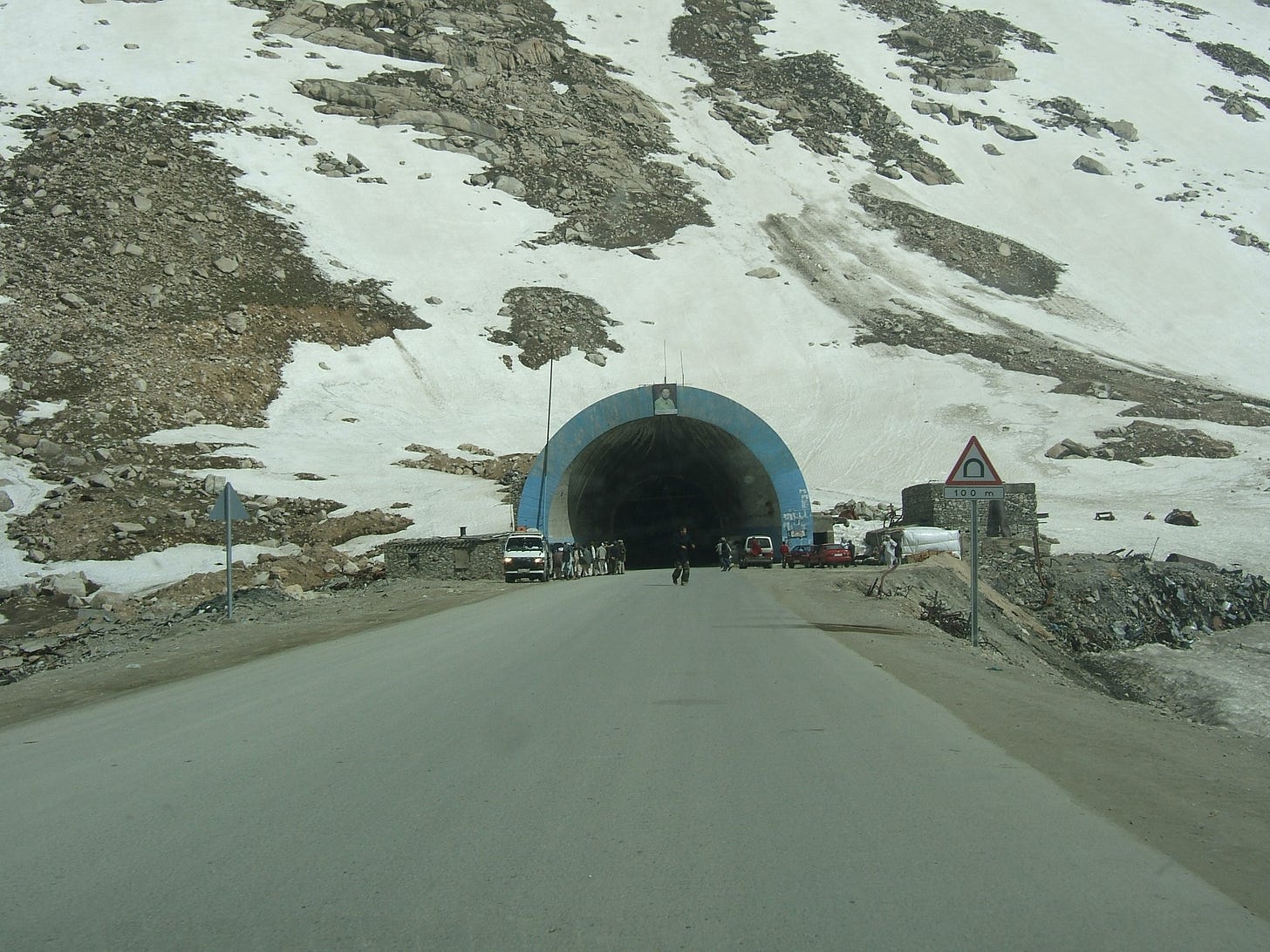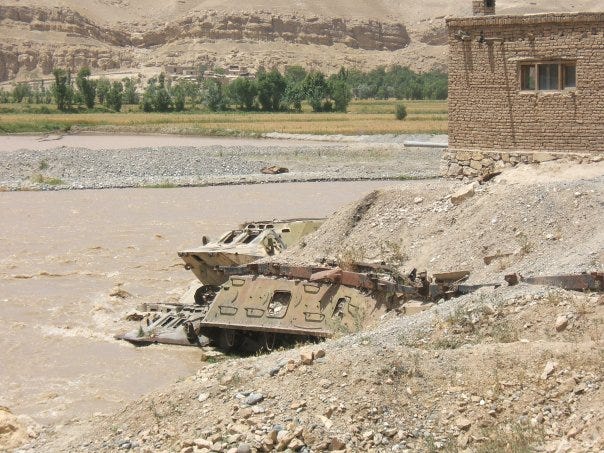I stayed in Kabul to find another contract, and Bruce was kind enough to host me during my job search. One evening, I was drinking in the Gandamak pub when Ben and Kimbra Dolan came in and told me they may have a job for me. The Dolans were heading home, but they had done some work for a company called WSI. The job was escorting a construction supervisor from the Florida panhandle as he toured all the Chinese brothels in Kabul. Ben said I was to fly out with the supervisor to Dubai, where I’d be paid and interviewed for the WSI country manager position.
The next night, I picked up the construction supervisor at the WSI compound on Jalalabad Road. He was a loud, short man from Florida, sporting a cowboy hat, cowboy boots, and a large rodeo belt buckle. As the evening progressed, he claimed that the only real cowboys left in America were in the Florida panhandle. I found his bragging about the number of prostitutes he could service and the quality of his breeding stock back home underwhelming. He was a big talker who had no interest in what I or anyone had to say, so I ignored him. I endured this for three long nights before he decided to head for Dubai.
I met the owner of WSI in his new office, where he had a staff of a dozen internationals from the US, South America, and Eastern Europe. He was a large man in the morbidly obese sense who had been the elected Sheriff of some town in Florida before somehow becoming a preferred subcontractor for DynCorp. He thanked me for looking after his engineer, gave me $5,000 in hundred-dollar bills, and asked if I’d like to be his country manager.
The Sheriff had several contracts for building Afghan National Police (ANP) training camps and a massive vehicle repair contract for both ANP and DynCorp trucks. His wife was a senior State Department official, which was the key to winning these huge contracts because the Sheriff was not a proficient or honest businessman.
The WSI compound was five miles east of the city on Jalalabad Road and had a warehouse full of lumber and electrical fixtures from America. The Sheriff had been informed that the military and State Department would soon require that fabricated offices, ablutions, and sleeping trailers be constructed to US building code standards using US-manufactured or approved hardware. This policy was a response to casualties in both Iraq and Afghanistan from electrocution in fabricated lavatories and shower trailers from substandard fixtures or incorrect wiring. The Sheriff had received good intelligence, but never figured the military would handle the new policy by flying in prefabricated units from the States. Hence, his overpriced Afghan Home Depot had no market.
He also had what he thought was 100% accurate insider information regarding weapons procurement for the ANP. He purchased 500 Heckler and Koch MP-5 submachine guns with an option for thousands more, confident that the new Afghan National Police would be armed with them. Instead of MP-5s, the ANP decided on the AMD-65, a Hungarian-manufactured variant of the AKM rifle used by Hungarian paratroopers (the “D” stands for Deszant, which means paratrooper). It’s a short-barreled, folding stock rifle with a short sight radius and fitted muzzle brake that throws noise and gas right into the shooter's face if used in tight quarters. You couldn’t hit much with them past 300 yards, either. The 7.62x39 mm rifle round was better than the 9mm pistol round used by the MP5s, but the AMD-65 was too inaccurate at distance to be a decent rifle and too hard to control to be a useful submachine gun.
My new company had construction supervisors, like the cowboy I had babysat, building Afghan police training camps in Jalalabad, Qalat, and Kandahar. They also had the security contract for JICA, the Japan International Cooperation Agency, which had offices staffed with our security specialists in Kabul, Mazar-i-Sharif, and Kandahar. My first order of business was to visit all the security offices and construction sites. My driver, Haji jan, was a relative of Yahya’s who accompanied me from the embassy job and would stay with me for the duration of my time in Afghanistan. We set out for Kandahar on my first day in charge.
The JICA security officer in Kandahar was an Egyptian who spoke good English but was sketchy. I asked him about the local security situation, knowing it was bad, but he said everything in Kandahar was fabulous, the locals were great, and he loved it there. JICA had pulled their experts out of Kandahar the month prior, so I asked the Egyptian what he did daily because he wasn’t sending local security reports to JICA HQ as required. He said he watched a lot of television and walked around town daily to get naan (local flatbread) and to hang out in tea houses. He never looked me in the eye when talking, which got him instantly on my shit list. I asked to see his weapons because I needed to record their serial numbers, and he produced a sawed-off double-barreled shotgun, an AK-47 without a stock, and an imitation Beretta 92F, probably built in Pakistan. The weapons were filthy, and only the AK had a serial number. I was going to ask if he ever cleaned them as I disassembled the pistol, but he gasped in amazement.
“How did you do that?” he asked, now looking me in the eye for the first time.
“Do what?”
“Take the pistol apart like that?”
“You’re joking me, right?”
“No, you must teach me. I have never seen a pistol before coming here.”
The Egyptian needed to go. He had no Japanese client to guard, and his counterpart in Kabul did his analysis of Kandahar because he knew the Egyptian was unreliable. I’d work on that problem after determining the extent of my other issues and could adequately prioritize.
My next trip was to check the construction office in Qalat, the capital of Zabul province. I was joined on the Qalat trip by the managing editor of the Long War Journal, Bill Roggio, who was new to the military blogging world and on his first trip to Afghanistan. After reading his blog post about our inspection tour, his wife said it would be his last trip to Afghanistan. Bill and I encountered armed Taliban on the Ring Road near the always dicey town of Shah Joy. They were on motorcycles, armed with dusty AKs and one RPK machine gun, weaving in and out of a convoy of fuel tankers while ignoring the traffic surging around the tanker convoy. I’ll let Bill finish the story:
“As we arrived near Shajoy, we encountered four armed men on motorcycles. Haji immediately identified them as Taliban, and Tim thought so as well. While they were wearing olive uniforms with Afghan National Police patches on the sleeve, Tim noted their weapons and motorcycles were not police issue. The armed motorcyclists weaved in and out of traffic. Haji blew past the bikers and further up the road we encountered a U.S. Army patrol of four Hummers on the side of the road. We pulled over, Tim explained what we saw to the Army captain, and the four bikers passed us by as we sat on the side of the road. The captain ordered his soldiers to mount up. We followed the Army patrol and quickly caught up with the bikers (they were driving low powered dirt bikes). The bikers intermingled with the Army patrol without incident and eventually pulled off the road. The encounter highlights the often murky nature of the war in Afghanistan. While we and the Army captain suspected the motorcyclists were Taliban, without provocation or a method to communicate on the fly to confirm their identity, the troops had to let them go. The soldiers chose to follow the rules of engagement. Opening fire on the bikers without positive identification could have caused the deaths of Afghan police and created animosity between the Afghan and Coalition security forces. Allowing potential Taliban to flee may allow them to kill Afghan civilians or Coalition security forces in the future. Welcome to the wild, wild west of eastern Afghanistan.”[1]
At Qalat, we had been in arrears with all the Afghan subcontractors for two months. Our construction manager told me we needed to pay his subcontractors immediately, or he was leaving before they decided to kill him. The following week Haji and I drove to Mazar-e Sharif to meet our JICA security officer, who was a 6’6” Aussie bloke of Pacific Islander heritage and a devout member of the Church of Latter-Day Saints. James didn’t drink, nor did he clog up the JICA internet watching porn. He was a former soldier and knew enough about weapons to know he didn’t need one in Mazar-i Sharif. We became instant friends, and it was a relief to know that our clients in the north had competent security.

The following month, we did not receive our monthly paychecks. The Sheriff had bolted back to Florida because Dubai frowned on foreigners operating from the Emirates who were not paying their payroll, rent, or taxes. We’d just received a pair of South Africans and four Filipino auto mechanics who were to start a massive country-wide contract fixing DynCorp vehicles. We had no tools, spare parts, or money, but the day the mechanics arrived, vehicles from DynCorp began to pile up in our compound. I leveled with the regional DynCorp manager about our orphan status, and he provided some tools, oil, oil filters, and a floor jack. The South Africans began to acquire or fabricate tools as needed and were constantly working on vehicle repairs. They spent their nights at a speakeasy/brothel, the Liberian-Lebanese brothers from the Embassy guard force camp adventure illegally set up near our compound.
Keep reading with a 7-day free trial
Subscribe to Tim’s Substack to keep reading this post and get 7 days of free access to the full post archives.


